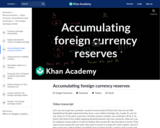
How and why a central bank would build foreign currency reserves. Created by Sal Khan.
- Subject:
- Economics
- Social and Behavioral Sciences
- Material Type:
- Lesson
- Provider:
- Khan Academy
- Provider Set:
- Khan Academy
- Author:
- Sal Khan
- Date Added:
- 08/10/2021

How and why a central bank would build foreign currency reserves. Created by Sal Khan.
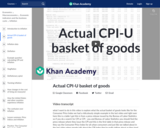
Exploring the actual weightings for the CPI-U basket of goods. Created by Sal Khan.

This course is an advanced course in macroeconomics that seeks to bring students to the research frontier. The course is divided into two sections. The first half is taught by Prof. Ivn Werning and covers topics such as how to formulate and solve optimal problems. Students will study fiscal and monetary policy, among other issues. The second half, taught by Prof. George-Marios Angeletos, covers recent work on multiple equilibria, global games, and informational fictions.

Topics change from year to year. Most recent topics include: optimal fiscal and monetary policy; optimal capital taxation; time inconsistency and incentive incompatibility of optimal policies; redistribution and political economics; heterogeneous agents and incomplete markets; Real Business Cycle models and new-keynesian models; endogenous growth; aggregate fluctuations and propagation mechanisms; recursive methods and robust control in macro.

We've learned about demand for a good or service, but aggregate demand is different: its the demand for everything bought in an economy. In this video, we discuss how aggregate demand (AD) is different from demand and why aggregate demand is downward sloping. Created by Sal Khan.

In addition to discretionary fiscal policy, there are policies and institutions that can help reduce swings in the business cycle. This video discusses the role of automatic stabilizers in the business cycle.
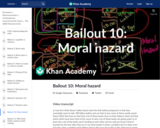
Alternate plans and moral hazard. Created by Sal Khan.

Why a CDO could be worth nothing even though they are "collateralized". Created by Sal Khan.
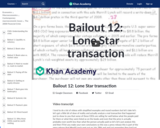
A real life example of a transaction involving CDOs. Created by Sal Khan.

Can the bailout work? Created by Sal Khan.
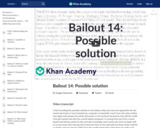
A solution that is MUCH fairer that has a MUCH better chance of working! Created by Sal Khan.
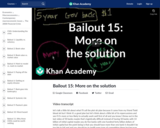
More on the "Plutsky Plan". Created by Sal Khan.
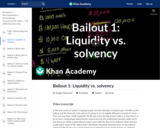
Review of balance sheets. Difference between illiquidity and insolvency. Created by Sal Khan.
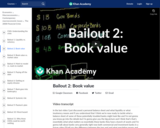
Hypothetical bank balance sheet. What book value means. Created by Sal Khan.
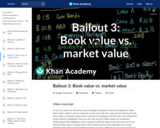
What it means when the market value of a stock is different from its book value. Created by Sal Khan.

Different ways of accounting for an asset. Mark-to-model vs. mark-to-market. Created by Sal Khan.
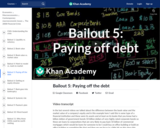
How the bank can liquidate assets to pay off debt that comes due. Created by Sal Khan.
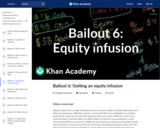
The bank gets bailed out by an equity infusion from a sovereign wealth fund. Created by Sal Khan.
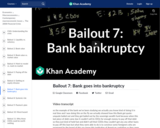
What happens when there is no equity infusion and the bank goes in to bankruptcy. Created by Sal Khan.
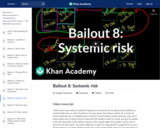
How the banks are connected. What happens when one bank fails. Created by Sal Khan.